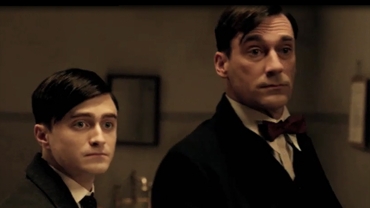I am pleased to announce the initial publication my translation of the 20th century Russian classic, The Master and Margarita, by Mikhail Bulgakov. Translating this novel from Russian to English has been a joy and an obsession; I finally feel that it is translated, edited, proofed and formatted to my satisfaction, and so ready to go out into the world. Currently it is only available as a Kindle e-book, but is days away from release as a trade-paperback. It will also soon be available on Apple’s iBooks store and at Barnes & Noble. Continue reading “Just Published: New Translation of ‘The Master and Margarita’ by Mikhail Bulgakov”
Tag: Stalin
Joseph Vissarionovich Dzhugashvili, 1878-1953; accomplished great things for the U.S.S.R from the late 1920s through W.W.II, but at staggering human costs.
Maria Petrovykh’s ‘Muse’
As it turns out, I did not win this year’s Compass Award for outstanding English language translation of Russian poetry, awarded through the Cardinal Points journal. I did not even make the short list.
Not too disappointed, though, as it was my first entry to any such competition, and now that I am no longer in the running I can present my work to anybody out there with any interest in the Russian poetry of the Soviet period.
This year the contest asked for translations of poems by Maria Petrovykh, a poet who was a friend of some of the greatest luminaries of the early Soviet period, notably Anna Akhmatova and Osip Mandelstam; Mandelstam’s poem, Masteritsa vinovatykh vzorov, that Akhmatova called “the greatest love poem of the 20th century,” was dedicated to Petrovykh.
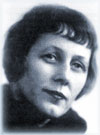
The poem of hers I chose to translate for this contest is Муза—‘Muse.’ As I had not been familiar with ther work until I learned of this competition, I decided this poem would be a good place to start as it might give a clue to what inspired her to write. It turns out that “night” was one of her muses at this time. This is not that surprising for someone who had just survived WWI, the Russian Revolution, The Russian Civil War, the “Red Terror,” unprecedented poltical, economic and social experimentation and the beginnings of Stalinist totalitarianism.
But aside from historical context, I found this to be a beautiful poem, and my humble translation a pale ghost of the real thing. As always I struggled in my efforts to balance meaning, meter, tone and rhyme. I feel convinced that sacrifices must always be made of one for another; a strict observance of the exact meaning of each word makes it impossible to convey the meter and rhyme, but departing too much from meaning for these feels like an abomination.
But sacrificies must me made.
That said, below is my translation, followed by the original:
Muse
When by mistake I let the pen slip,
Missing the inkwell, near the moon see it dip,-
To the lake of black nights in its unceasing creep,
Is stitched the overgrown inkwell with a dream from the nightingale’s keep,-
Diverse harmonies rush from the pen,
An astonishing layer of silver on them,
They are like birds, of whose touch I am afraid,
But the lines flock together and fill up the page.
I welcome you here, wild-running night,
And we have exactly one origin and plight-
We are both dark for our doubting eyes,
One homeland we share and she never dies.
I remember how you were conquered by day,
You remember how I, from the rock, broke away,
You ever from the milky paths turn aside,
In the cracks of the lines you do love to hide.
Child of a dream, sketched with nightingale’s hues,
Solitary reader, you are my muse.
I see you off, with no thanks for your time,
But in a froth of delight, I am brimming with rhyme.
1930, Maria Sergeyevna Petrovykh
translated by John Dougherty Continue reading “Maria Petrovykh’s ‘Muse’”
“Mastering the Art of Soviet Cooking—” Portraits of Life in the USSR, with Recipes!
Review—Mastering the Art of Soviet Cooking: A Memoir of Food and Longing, by Anya von Bremzen
Crown, 2013
On sale—September 17, 2013 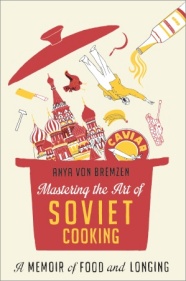
One could be excused for imagining that a book with the title Mastering the Art of Soviet Cooking might be a collection of recipes, with details about the finer points of food preparation in the former Soviet Union. The subtitle, “A Memoir of Food and Longing,” hints at a more personal account. Neither of these, however, prepare the reader for the epic of family history, biography, autobiography and scholarly assessment of the Soviet Union presented in this excellent new book by Anya von Bremzen, former citizen of the USSR and three-time James Beard Award winner. While this may seem like too much for a single volume, it is artfully stitched together using food, in all its meanings, as thread. The tale of the creation and eventual dissolution of the Union of Soviet Socialist Republics is one of, if not the grandest narrative of the 20th century. Anya’s stories of herself, her grandmother, and especially her mother, are engaging and endearing, and breathe life into the stock of familiar characters and events in the history of the USSR. Her well-crafted distillations of the theses and arguments of prominent academics on subjects such as the “nationalities question” and Stalinist totalitarianism are usually spot-on. All this is brought together by how it informs, and is informed by, food.
Any illusions that this is a book celebrating the quality of Soviet cuisine are quickly put aside when the author admits, in mentioning her mother’s love for sosiski, i.e.- Soviet hotdogs, that “besides sosiski with canned peas and kotleti (minced meat patties) with kasha, cabbage-intensive soups, mayo-laden salads, and watery fruit kompot for desert—there wasn’t all that much to eat in the Land of the Soviets.” Continue reading ““Mastering the Art of Soviet Cooking—” Portraits of Life in the USSR, with Recipes!”
‘Крестьянин и тинейджер’
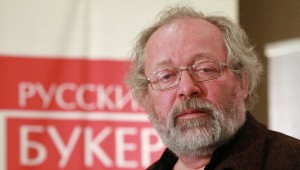
Andrei Viktorovich Dmitriev’s Крестьянин и тинейджер-The Peasant and the Teenager: A view of Russia in its last decade as a Republic of the U.S.S.R.
Recently I have been engaged in translating and studying certain novels that have won the Russian Booker Prize, an award presented yearly since 1992 to honor outstanding Russian fiction . With this exercise I seek to gain a broader understanding of contemporary Russian thought and culture. My primary interest is in how Russians today view their own history, especially that of the Revolution of 1917 and the Soviet period.
The two works I’ve looked at most recently serve to bookend this period: Казус Кукоцкого (Kazus Kukotskovo = ‘The Extraordinary Case of Kukotsky’), by Lyudmila Evgenyevna Ulitskaya, and Крестьянин и Тинейджер (Krest’yanin i Tinyedzhyer = ‘The Peasant and the Teenager’), by Andrei Viktorivich Dmitriev. In a recent post (‘Казус Кукоцкого’) I examined Ulitskaya’s novel as to how it portrays the Revolution and its aftermath, finding her views consistent with my own narrative of this period. Turning to Dmitriev’s ‘The Peasant and the Teenager,’ I was delighted to find not only a portrayal of Russia in the decisive last decade of the U.S.S.R., but one from the perspective of rural, ‘collective farm’ Russia. Continue reading “‘Крестьянин и тинейджер’”
‘A Young Doctor’s Notebook,’ Episode 1; Starring John Hamm and Daniel Radcliffe—Reviewed
A ‘Playhouse Presents’ Production, ‘A Young Doctor’s Notebook,’ Based on Mikhail Bulgakov’s ‘Notes from a Country Doctor’
I was not sure what to expect from a British TV production of a series based on the semi-autobiographical sketches of Mikhail Bulgakov, written in the mid-1920’s in Russia (see earlier post—‘Harry Potter and Don Draper do Bulgakov’). This four-part Playhouse Presents production, ‘A Young Doctor’s Notebook’, was initially aired at the end of 2012 on Britain’s Sky Arts network. On viewing the first episode, I was not surprised to find it to be very British in many ways, but with an impressive stock of allusions to Russian literature and culture. A great deal of effort seems to have been spent to get a lot into the seemingly simple story of the arrival at an isolated, seriously understaffed rural hospital, of a newly graduated medical student from Moscow. Continue reading “‘A Young Doctor’s Notebook,’ Episode 1; Starring John Hamm and Daniel Radcliffe—Reviewed”
Третья Мещанская: “№ 3 Meshchanskaya Street”, or “The Third Philistine”?
A Look Back at Abram Room’s Classic Film, Третья Мещанская: a picture of life in Moscow after Lenin, but before the full force of Stalinism.
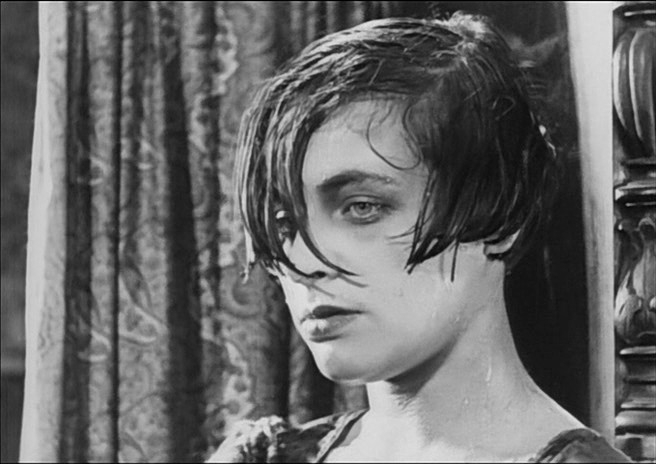
The focus of my Russia studies has recently turned, through no conscious design of my own, to the period between the two World Wars, in the first half of the twentieth century. This may be no accident, though, as I am deeply fascinated by the unprecedented levels of dynamism, change, brutality and vision of Russian society in the decades after the Revolutions of 1917. My translations of Bulgakov and Mandelstam, my examination of the Soviet Five Year Plans, and my review of Douglas Smith’s book Former People all relate to this era when the revolution was still finding its way (see earlier posts- ‘The Old-Timers of Moscow Will Remember,’ ‘Leningrad,’ ‘All According to Plan,’ ‘Former People’). Deciding to continue in this direction, I thought I should take another look at a Russian silent film from 1927, variously called Третья Мещанская (Tret’ya Meshchanskaya), Любовь втроём (Lyubov’ Vtroyom), Three in a Basement (in Germany) and Bed and Sofa (in English speaking countries). I was introduced to this film as an undergraduate in a class on Soviet film, but watching it again, investigating its history and looking at some of the reviews published in Russia when it first came out, highlight for me the tasks Russians faced in trying to create a new society after the shattering of old social conventions, and the efforts of the Communist Party to define new ones. With this in mind I will offer my own review. Continue reading “Третья Мещанская: “№ 3 Meshchanskaya Street”, or “The Third Philistine”?”
The Fate of the “Former People”: Social Modernization in Russia Compressed
Review—Former People: The Final Days of the Russian Aristocracy,
by Douglas Smith
Farrar, Straus and Giroux, 2012, 464 pp.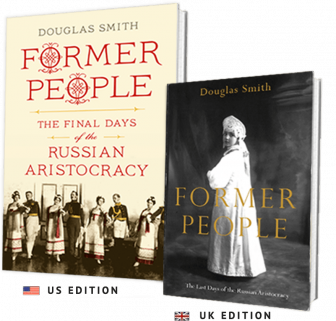
In 1946, George Kennan argued that the “ideology, and the circumstances of power” inherent in the Soviet regime required the Communist Party to have enemies to point to in order to legitimize its exercise of complete and exclusive control over the economic, political and social life of all citizens of the U.S.S.R. Kennan believed that by the end of World War II, it had become increasingly difficult to target internal “enemies of the revolution”—the purges of the 1930s could hardly have been more effective at eliminating them. But the war, and the subsequent competition among the victors for regional and global influence, allowed the Party to point to external enemies: the capitalist regimes of the West. Thus, with Kennan’s help, the Cold War was initiated.
But who were these “enemies” within the Soviet Union prior to the Second World War? Douglas Smith goes a long way to bring home the reality of one group of these “counter-revolutionaries”—the so-called “former people.” Continue reading “The Fate of the “Former People”: Social Modernization in Russia Compressed”
“The Old-Timers in Moscow Will Remember! . .”
As I was translating a passage from Master and Margarita, it dawned on me that what I was reading was the author’s own reflection on the kinds of changes that Moscow had gone through during the two decades that saw World War I, revolution, the end of Tsarism, the establishment of Communist Party rule, Civil War and the creation of the Union of Soviet Socialist Republics. Given what I know of Russian history, I found this little aside in chapter V to be enormously interesting, bold and insightful. Continue reading ““The Old-Timers in Moscow Will Remember! . .””
All According to “The Plan”
In a previous post I commented about use of comedy, satire, absurdity and fantasy in Russian literature to mask political or social commentary, and hopefully avoid censorhip. I found in the first chapter of Master and Margarita what could be read as a critique of policies that were at the foundation of the Communist Party’s attempt to realize a socialist/non-capitalist economy in the Soviet Union—the Five Year Plans.
But first a brief overview of the history of Soviet economics: Continue reading “All According to “The Plan””


